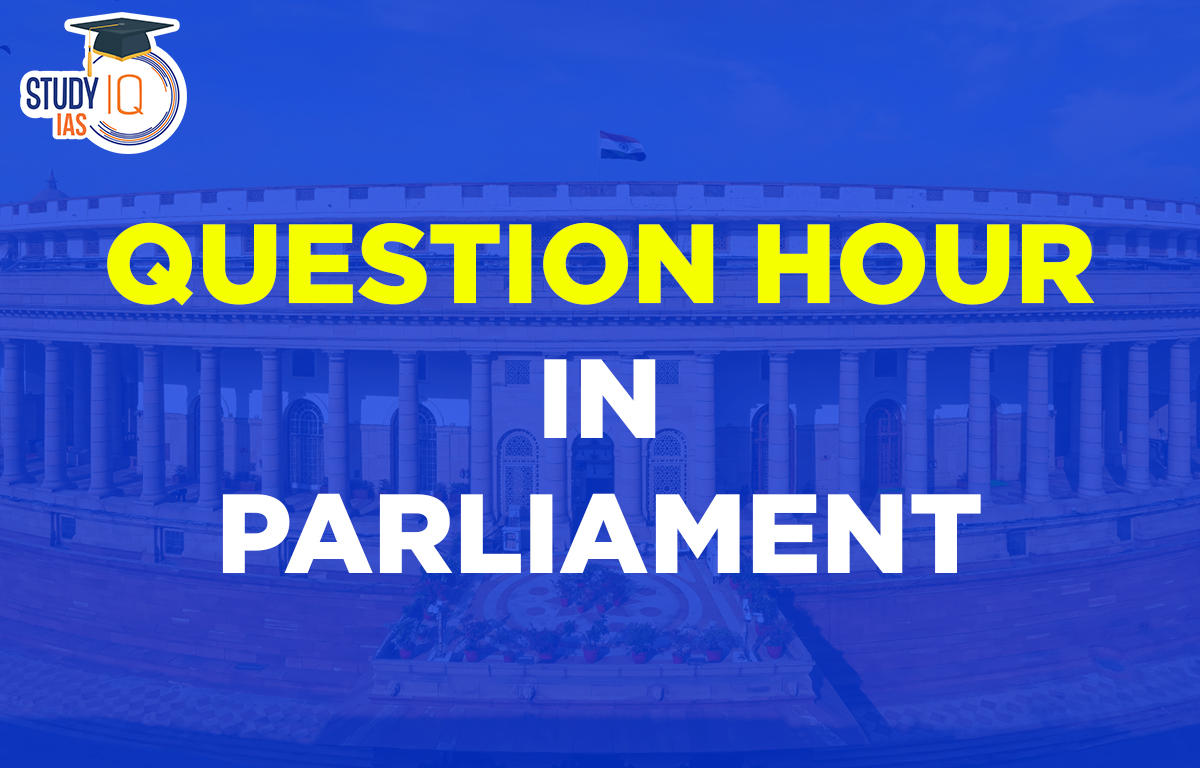Table of Contents
Question Hour in Parliament
The time set aside for questions is known as Question Hour. The first hour of each Lok Sabha session is devoted to question and answer sessions regarding various facets of administrative work. When the House convenes for the session, it typically begins at 11 AM. In contrast, Rajya Sabha’s question period typically begins at noon, when the House convenes for the day’s session.
The Parliamentary System’s Question Period is a crucial tool for ensuring ministerial accountability. The Question Hour in a Parliament is an important part of Indian Polity which is an important subject in the UPSC Syllabus. Students can also go for UPSC Mock Test to get more accuracy in their preparations.
Question Hour in Parliament Meaning
During Question Hour in Parliament, which occurs at the start of each parliamentary session, important questions are intended to be raised in order to hold the government accountable. The Constitution makes no mention of Question Period. Both houses of the Parliament’s Rules of Procedure mention it. The responsible Minister must react to the Parliament either orally or in writing, depending on the type of question posed.
Questions may be directed at both the minister and non-ministerial private members. Not less than 15 full days after the date for which the notice is specified, the Notice to the Questions must be given in writing.
Read More: Zero Hour in Parliament
Question Hour in Parliament and Question Types
Below given is the type of question that has been asked during Question Hour in Parliament:
Starred Questions
A question marked with a star is one that primarily calls for the minister in question to give an oral response. After then, the minister must go before the House and respond. The person posing the question is required to star it with an asterisk to indicate that it is a starred question. The answer to a starred question may be followed by a number of follow-up inquiries from the audience. On any one day, a maximum of 20 questions may be presented for oral responses.
Unstarred Questions
Unstarred questions are those that primarily require the minister in question to lay a written response on the table of the House. Such inquiries do not accept follow-up inquiries after the initial response. These quizzes are printed in the color white. A single day may only have 230 questions brought up for written responses.
Also Read: No-Confidence Motion
Questions to Private Members
A private member who is an MP but not a Cabinet Minister may also be questioned. A specific question’s subject matter must be related to a House-related Resolution, Bill, or other item. This also has to do with the concerned MP holding them accountable.
Short Notice Questions
A member has the option to submit such a query with less than ten days’ notice. This inquiry must deal with urgent matters affecting matters of general significance. Such inquiries may receive spoken responses from the minister. Additional inquiries are welcome in this situation.
Also Read: Devices of Parliamentary Proceedings
Question Hour in Parliament Significance
The Question Hour is a crucial aspect of Parliamentary proceedings. In the legislature, members are naturally and unrestrictedly free to ask questions. Because of Question Hour, the government can quickly gauge public sentiment and modify its policies and initiatives. Questions can be used by ministries to gauge public opinion of their administration and policies.
Questions draw the ministers’ attention to many errors that might otherwise go undetected. Questions may result in the creation of a commission, a court of inquiry, or even legislation when issues raised by members are serious enough to disturb the public’s mind and are of broad public interest. For instance, one of the financial frauds involving LIC’s investment in the business of Mundhra was exposed in the Lok Sabha in 1957.
Also Read: Parliamentary Privileges
Question Hour in Parliament Related Facts
When the broadcasting of parliamentary sessions began in 1991, Question Hour became an even more powerful weapon for holding the administration accountable. To improve the efficient operation of the house, Rajya Sabha Chairman Hamid Ansari moved the Question Hour from 11 AM to 12 PM in 2014. The “draw of lots” from the notices received up until the last date determines the Priority of the Question.
On pink and yellow papers, respectively, are printed the questions intended for written and oral responses. Before the start of the meeting, a member may withdraw or postpone their question. All of the starred and unstarred questions with written responses are placed on the table the next day in the event that Question Hour is postponed or the house is adjourned. Every day of the session, with the exception of the budget day and the President’s joint address to both chambers, has a question and answer period.
Also Read: Public Accounts Committee
Question Hour in Parliament UPSC
Members of Parliament may ask questions about any part of administrative activity during the Question Hour, which is scheduled for the first hour of every legislative session.
A member may offer supplemental questions after the minister in question has given an oral response to a starred question, but an unstarred question only receives a written response and cannot be followed by supplementary questions. Students can read all the details related to UPSC by visiting the official website of StudyIQ UPSC Online Coaching.





















 WhatsApp
WhatsApp